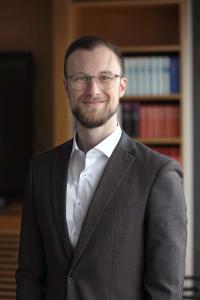"Pöttering speaks out for rights of Christians in Islamic societies" - Regional Programme Gulf States
Event Reports
Dr. Pöttering explained to his audience of more than 200 mostly Arabic politicians, scientists and businessmen that it cannot be accepted that Europe grants Muslims the right to build Mosques under the principle of Freedom of Religion while some Islamic countries deny Christians the opportunity to practice their faith. “Tolerance is not a one-way-street,” stated Pöttering.
The United Arab Emirates (UAE) are a role model for other nations, said Dr. Pöttering, as they allowed churches to be build and the Christian believe is being respected and tolerated.
“We don’t necessarily have to accept the other’s faith but we do have to respect it. The idea of the dignity of man calls for this!” stressed the Chairman of the Konrad-Adenauer-Stiftung. To Pöttering the Freedom of Religion plays a central role in avoiding the „Clash of Civilizations“: “To avoid the much quoted clash of civilizations we need a frank and honest dialogue, that has to be conducted with the utmost respect for the other - and with tolerance.”
In his lecture on „Europe and the Gulf – Common Challenges and Perspectives“ the KAS Chairman praised the UAE’s role in leading the economic development in the region. „I don’t know of any other place that has developed so positively in such a short amount of time,” said Dr. Pöttering. The UAE plays a similarly central part in the Gulf Cooperation Council (GCC) as do Germany and France in the European Union. The former President of the European Parliament sees great potential in the cooperation between the EU and the UAE: „So far this cooperation has been strongly dominated by bilateral relations. Individual GCC-countries regard individual European countries as strategically relevant partners rather than the EU as a whole. Reasons for this are historically grown relations on the one hand and the political as well as economic strength of individual EU-member states on the other”, explained Pöttering.
To extend and facilitate the collaboration with the European Authorities plays an integral part in the mission of the Regional Program Gulf-States of the Konrad-Adenauer-Stiftung here in Abu Dhabi.
The United Arab Emirates maintain excellent bilateral relations with Germany as well. Politically and economically both nations work closely together as well as in questions of security, development and culture. These bilateral relations constitute a strong foundation to intensify the strategic partnership between the two regions.
The strategic relevance of the GCC for the EU is obvious: The GCC is the EU’s most important trading partner in the Arab world. More than half of all trade conducted with Arabic nations related to the GCC, which makes it the 6th largest export market for the EU. In turn the EU is the prime export market for the GCC. In 2008 EU-exports to the GCC-States amounted to 68.8 bn. € – with 17.5 bn. € German exports – imports from the GCC-States amounted to 38.4 bn. €.
Relations with the EU as an important player in international politics give the GCC the opportunity to further extend and intensify its foreign relations, said Dr. Pöttering. The project of European Integration could be an example for the regional integration efforts within the realms of the GCC. The GCC’s integration efforts can be a decisive contribution to stabilizing the Gulf-region. The GCC could facilitate the creation of an institutionalized framework for a partnership in issues such as the economy, energy and security, explained the KAS-Chairman.
Pöttering stressed, the EU and the GCC do not only share economic interests. Security policies require just as much joint actions of the regional blocks. The increasing interconnectedness of a globalized world presents the international community of states with challenges and issues that can be solved neither by individual states nor regional units. It would be only logical for the EU to become a permanent member in the UN Security Council. “We need to work together, within regions, but foremost between regions, for example between the EU and the GCC,” said Dr. Pöttering.
Conflicts like the ones in Iraq, Iran and Yemen as well as the Middle-east conflict can lead to a destabilization if the region. “These conflicts also have a direct consequence for Europe,“ stated the chairman. The EU and the GCC are so closely intertwined into the world economy that both have the urgent interest to not only overcome the economic crises but to support a sustainable development for the world economy.
„The example of the EU shows that close political and economic regional integration can offer additional protection against the obstacles of a globalized economy,” explained Pöttering. The GCC countries take a similar approach. The Free Trade Agreement (1983) and the Customs Union (2003) as well as the „Common Market“ that came into effect in 2008 present successful integration-projects in the region. They are of considerable economic and political importance.
On closing his lecture, Dr. Pöttering expressed the wish for co-existence of all nations and cultures in the spirit of Konrad-Adenauer: „What we need is to work together as the world-wide family of human kind“. The Konrad-Adenauer-Stiftung contributes to this considerably with its projects in more than 100 countries around the world.
In direct talks before the lecture Dr. Pöttering and the Director of the ECSSR Dr. Jamal Al-Suwaidi agreed on the dispatch of a researcher from Germany to the ECSSR. „The academic exchange can contribute greatly to a mutual understanding between cultures“, said Pöttering.









